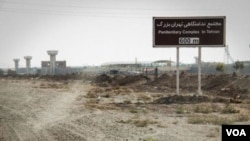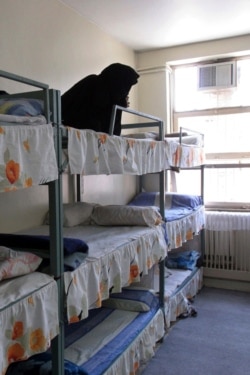Iranians jailed for alleged political and security crimes and their relatives are making increasingly anxious appeals for them to be temporarily released to avoid the risk of coronavirus contagion in Iranian prisons.
Iran’s health ministry reported 2,336 confirmed cases of the virus that causes the disease COVID-19 on Tuesday, a more than 50% increase from the day before. It said another 11 infected people had died, raising Iran’s death toll to 77, the highest outside of China where the virus first emerged in December.
Iranian officials have not confirmed any coronavirus cases in prisons. But in recent days, human rights activists have reported learning of cases in several major prisons where Iranians and some foreigners with dual Iranian nationality have been jailed for political and security crimes.
In televised remarks on Tuesday, Iranian judiciary spokesman Gholamhossein Esmaili said authorities temporarily have released 54,000 prisoners who tested negative for the virus, while refusing to grant furloughs to “security” prisoners serving more than five-year sentences. He said authorities may exempt some of those prisoners from that rule, but did not name them.
In a voice message to VOA Persian, the Dusseldorf, Germany-based sister of Iranian environmentalist Sam Rajabi, who is serving a six-year sentence at Tehran’s Evin prison for security offenses, criticized the Iranian government’s policy of excluding security prisoners with more than five-year sentences from furloughs.
“The virus is unaware of sentences when it infects people,” said Katy Rajabi, in a message broadcasted Tuesday on VOA Persian’s Straight Talk call-in show.
Rajabi said she had recently spoken by phone to her brother, whom she said had been suffering headaches but was feeling better. But she expressed concern about the contagion risk facing Sam Rajabi and seven of his fellow environmentalists who were handed lengthy final prison sentences last month after having been detained since 2018.
“We are very worried because the prison is a closed environment. Our demand is that they should be given leave until the danger [of the coronavirus] is gone,” Katy Rajabi said.
On Saturday, the Britain-based husband of Nazanin Zaghari-Ratcliffe, a British-Iranian woman jailed in Iran since 2016, said he learned she was ill and feared she had contracted the virus at Evin prison. Speaking Tuesday, Esmaili said Zaghari-Ratcliffe was in good health, without providing evidence.
Zaghari-Ratcliffe’s husband, Richard Ratcliffe, also has told British television that Iranian authorities have refused to test his wife for the virus.
Evin prison authorities also have refused to test sick inmates housed near jailed Iranian-American Siamak Namazi, according to his Washington-based lawyer Jared Genser.
Another appeal for help came from imprisoned members of Iran’s Sunni minority, who sent an open letter to VOA Persian and human rights groups on Tuesday.
In the letter, whose assertions VOA could not verify independently, the group described itself as 100 Sunni prisoners of conscience held in three wards of Rajaei Shahr prison in the northern city of Karaj. It said prison authorities had not taken measures to prevent the spread of the coronavirus despite many inmates falling ill.
The authors of the letter also accused the prison of ignoring their requests for masks, gloves and disinfectants and refusing to grant them temporary releases.
“We call on international bodies, and in particular the World Health Organization, to prevent the possibility of a deadly catastrophe due to coronavirus in the prison,” the authors said.
Iran’s government had no immediate response to the letter.
Washington-based rights group Abdorrahman Boroumand Center said the assertions of the Sunni prisoners were consistent with what its own sources have said about conditions at Rajaei Shahr prison.
Iranian officials have said they are intensifying their efforts to combat the nationwide spread of the virus, after facing strong domestic criticism from Iranian social media users who have accused them of mismanaging the health crisis.
This article originated in VOA’s Persian Service, in collaboration with VOA’s Extremism Watch Desk.





